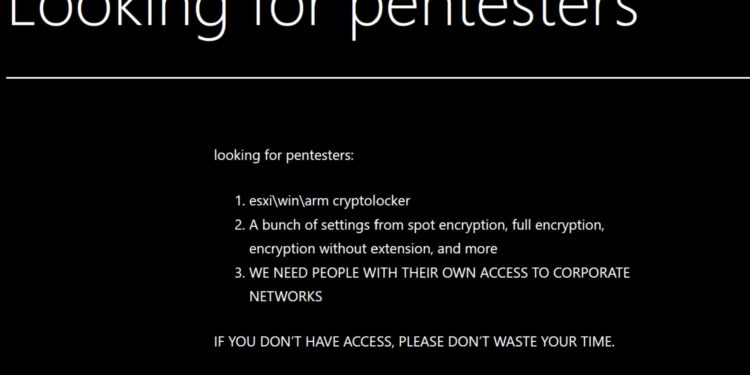The MedusaLocker ransomware group has begun actively recruiting professional penetration testers, or “pentesters,” on its dark web leak site, marking a significant and troubling evolution in cybercrime. This shift signals a move toward professionalizing malicious operations, as ransomware-as-a-service (RaaS) groups adopt more business-like structures to maximize profits and efficiency.
A pentester is a cybersecurity professional typically hired by organizations to legally hack into their systems. Their job is to identify and exploit vulnerabilities before malicious actors can, providing crucial insights to help a company strengthen its defenses. MedusaLocker’s recruitment, however, inverts this traditional role. By hiring pentesters, the group is looking to leverage their advanced skills in reconnaissance, vulnerability exploitation, and network mapping to bypass security and infiltrate target networks more effectively. The group is specifically seeking candidates with experience targeting ESXi, Windows, and ARM systems, and has a preference for those with existing access to corporate networks.
This development underscores the growing sophistication of cybercriminal enterprises. Ransomware groups are no longer just opportunistic attackers; they’re becoming structured organizations with specialized departments and hiring processes. This approach allows them to outsource risk and optimize their attacks, making them more dangerous and difficult to combat. Instead of relying on broad, indiscriminate attacks, they can now use a professional’s expertise to carry out highly targeted and lucrative campaigns.
MedusaLocker is a RaaS variant that encrypts files on compromised systems and demands cryptocurrency ransoms. The group, which is distinct from the similarly named Medusa ransomware, operates a profit-sharing model where the ransomware developer receives a cut, and affiliates, the individuals who deploy the ransomware, get the rest. MedusaLocker’s use of pentesters is a logical step in this business model, as it ensures their affiliates have the best possible tools and expertise to succeed. This strategic recruitment effort highlights how groups like MedusaLocker are adopting legitimate business practices to enhance their illicit activities, blurring the lines between corporate espionage and cybercrime.
The professionalization of cybercrime poses a challenge for cybersecurity professionals and law enforcement. As threat actors become more organized and use advanced tactics, organizations must also evolve their defensive strategies. This includes not only strengthening technical security controls but also understanding the human element of these threats, that highly skilled individuals are now being enticed to use their talents for criminal gain.










![Online Scam Cases Continue to Rise Despite Crackdowns on Foreign Fraud Networks [Myanmar] Online Scam Cases Continue to Rise Despite Crackdowns on Foreign Fraud Networks [Myanmar]](https://sumtrix.com/wp-content/uploads/2025/06/30-12-120x86.jpg)





